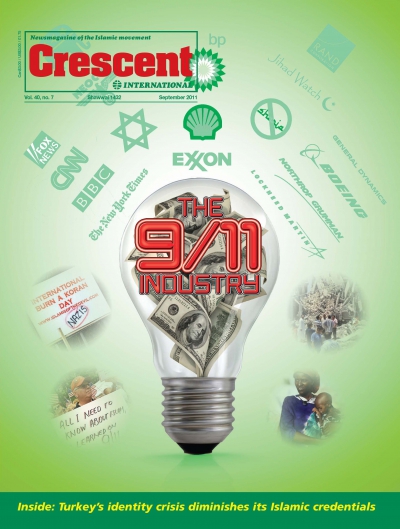Crescent International Vol. 40, No. 7
Newsmagazine of the Islamic movement
Zafar Bangash, Afeef Khan, Muhammad H. al-'Asi
Shawwal, 1432 2011-09


Saudi king Abdullah may appear dour at the ripe old age of 87 and with one leg already in the grave, but he is not without sense of humor. On August 8, he broadcast a message on Saudi television calling on President Bashar al-Asad of Syria to implement “comprehensive and quick reforms” in his country.

As the 10th anniversary of the 9/11 attacks draws near, prepare to be bombarded with propaganda in the form of repeated television footage of the hijacked United Airlines Flight 175 crashing into the South Tower of the World Trade Centre with the North Tower already in flames.

“All Muslims are not terrorists but all terrorists are Muslims” is an oft-repeated mantra in the West. This is even repeated by carpetbagger Muslims that should more accurately be described as Muslim-Zionists. What is the truth behind the assertion about all terrorists being Muslim?

As for the US economy, despite optimistic statements by President Barack Obama that it is on the mend — what else can he say? — statistics paint a very different picture.

The riots in London and other British cities that briefly captured world headlines last month were not unexpected. Ever since the economic downturn began to bite, and particularly since the election last year of a right-wing government dogmatically committed to cutting the benefits of the poorest and the taxes of the wealthiest, social commentators have been warning of the possible reactions to such measures.

There are thousands of ways to look at 9/11. Much has already been said about 9/11 and much more will be said in the years to come. Here is what we think about this milestone in the politics of the 21st imperialist century.

It would be reasonable to assume that most normal people would overcome their anger after a decade. Not so the Americans, and now the Europeans as well. Since the attacks of 9/11, the world has been turned upside down.

The Islamic awakening sweeping the Muslim East has affected many parts of the world. Malaysia may not be the most likely place to experience revolutionary change of Middle Eastern proportions, but it nonetheless has not remained unaffected.

Beyond the drum-beating and chest thumping about what a great job the Canadian soldiers did in Afghanistan, the question that needs to be asked is: what exactly did they achieve despite spending $20 billion on a war that is still raging and the Afghans are no better off today, in fact much worse, than they were 10 years ago?

Over the past year the political scene in Azerbaijan has been dominated by two centers of power: the autocratic regime centered around Aliyev and the Islamic movement centered around activists, journalists, scholars, lawyers and the wider Azeri population.

Given the straightjacket in which Abbas and his disgraced cohorts operate, not only is it entirely unlikely for him to defy Israeli Prime Minister Benjamin Netanyahu, but it is hard to imagine he possesses any courage to defy his paymasters.

A large percentage of Muslims worldwide have become quite enamored with the phenomenon of Recep Tayyip Erdogan and the political party — the Development and Justice Party (AKP) — he leads in Turkey.

After distorting the teachings of their own religion, Christianity, and then abandoning it all together, the Western world is now busy trying to give the same treatment to Islam in order to subvert it.

In the grand old days of colonialism, European nations used all sorts of elaborate excuses for occupying the fabulously wealthy territories of Africa and Asia. Rudyard Kipling called it the “white man’s burden” to transmit (European) culture and civilization to the unwashed natives.

Soon after the so-called Arab Spring began to blossom, Turkey’s popularity has been on the rise in the Arab world. Since the Justice and Development Party (AKP) was first elected in 2002, Turkey with its flourishing democracy, and rapidly growing economic and military might has become an emerging regional power.

Zainab Cheema reviews Timothy H. Parsons’ The Rule of Empires: Those Who Built Them, Those Who Endured Them, And Why They Always Fail, published by Oxford University Press, 2010 (480 pages, hard cover, $29.95). Scholarship on empire is a veritable industry.

Even as Zionist Israel loses international support because of its cruel siege of Gaza, and is internally convulsed by strikes, one policy constant is its attacks on unarmed civilian Palestinians. On August 18, a series of airstrikes were launched against Gaza killing almost a dozen people including several children.
